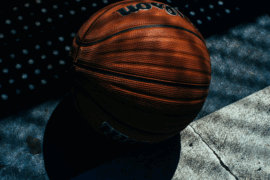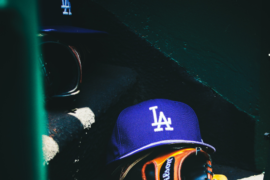Sweat trickles down my back as we sizzle in the Seattle sun, a rare 85-degree scorcher for this city on the sea. A train whistle blasts just beyond the left-field fence, and seagulls flap above our upper deck seats. Long rectangles of perfectly mowed grass criss-cross beneath us as we peer down upon groundskeepers who rake, drag, and sweep a zen garden. I’m here on a mission with two goals: 1) instill an appreciation for the game of baseball in my oldest boy, and 2) witness what feels miraculous: a kid I once coached is stationed behind home plate as a member of the Baltimore Orioles.
It seems like an ideal day until two gentlemen arrive double-fisting beers; soon, they appear to be auditioning for a new podcast pontificating about politics, the weather—and strangely—the menace of seagulls. A few white birds flutter next to the stanchion of the upper deck, and one guy growls, “It’s time to kill these pests. They slaughter so many salmon in the ladder—it’s an absolute atrocity!” This banter, fueled by light beer, becomes more animated and outraged with each swig—travesties upon travesties, with little mention of the game. I cringe with each curse word and hope my son, at his first major league game, isn’t garnering a profanity lesson laced with bizarre conspiracy theories. My agenda is to cultivate a life-long fan, but I’m remembering not everything about a stadium is kid-friendly.
Will, seven-years-old, thankfully, is more focused on his agenda at this game: tasting dip and dots for the first time. Before arriving at the stadium, he asked if this trip, like all visits to sporting events, would involve a special treat—something usually off-limits and packed with sugar—my go-to-bribe when I want my young boys to accompany me to an event that requires sitting relatively still for long stretches of time. Yes, I confirmed, he could pick out something at the game. Since this verbal agreement, he has inquired incessantly about the time and place of said snack. After asking with each out—almost each pitch—if it is time yet, we negotiate a fourth inning expedition.
After a third strike, we push through the crowd to a pop-up stand, seeking the revolutionary ice cream. People wield tridents clad in turquoise and green gear. Will bobs up and down and jabs me with excitement; a vendor hands him a small, plastic bowl, in which America’s pastime collides with our obsession for innovation and sugar, creating a strange cryogenic dairy concoction. “That’ll be $8.95,” he says.
For the cost of dinner, I snag two beers, one for me and one for Pop, who has graciously agreed to join us for seven hours of driving and three hours of baseball. When we get back to our seats, we choose an open row, just out of earshot from the increasingly inebriated pundits.
The stadium erupts with the crack of the bat, fans rise with the ball as it careens into the left-field bleachers—fireworks blast off from the top of the stadium and we join 20,000 jubilant fans who are dancing and shouting in step with staccato electronic bass thrumming through the speakers. The game is close, the Orioles trailing most of the contest.
“There he is!” I say to Will when a massive image of Adley Rutschman appears on the scoreboard beyond center field. From high school hallways to plush locker rooms, from a small suburb of Portland, Oregon to the city of Baltimore, Adley is brushing shoulders with the world’s greatest baseball players. In his first all-star game, also in Seattle, he donned a sport coat and took his seat at the table with some of my childhood idols: Derek Jeter, David Ortiz, and Alex Rodriguez; I nearly fainted seeing him casually answer questions from my heroes—Jeter even reminisced how he had made a special trip out to Corvallis, Oregon to scout Adley in college. Imagine that: The Captain coming to a game to watch you play.
I first met Adley when he was taking batting practice in our college facility, an elementary kid crushing baseballs with a smooth swing beyond his years; his dad, Randy Rutschman, threw to him after coaching our three hour practice. Rutsch, as we called him, was always bursting with enthusiasm and energy and was beloved by our team. “Motion creates emotion,” he would say, shuffling through the gym doors at 5:00 am during our winter baseball practices. He walked briskly—his signature shuffle-jog—getting stations set up for our catchers. Unlike every other person in the gym at that moment, Rutsch genuinely seemed thrilled to be under the fluorescent lights well before the sun was up.
Before he was a coach—and even after his coaching days began—Rutsch remained active on the diamond; he kept his catching career going into adult leagues well into his forties. He played football and baseball down the road in Mcminnville, Oregon at Linfield University, and he coached at George Fox University for decades. From 1999 to 2004, he coached the Corvallis Knights in the summer, even catching for the team until 2002. With his wealth of knowledge, his indefatigable energy, and his positive approach, Rutsch was an integral member of our baseball program and is still a highly sought after instructor and consultant—though his main priority in the baseball season is now watching his son at various major league stadiums.
Randy’s dad, Ad Rutschman was a legendary coach, leading football and baseball teams at Linfield College before becoming the athletic director. Ad won national championships in both football and baseball—the only college coach to have achieved this feat.
I remember looking toward the bleachers and seeing both Randy and Ad at our high school games, wondering what critique they might have for our coaching staff. To say I “coached” Adley might be a stretch; it’s more accurate to say I watched him play and encouraged him from time to time. I don’t recall telling him anything that improved his knowledge of the game, or led to skill increase. His slightly open batting stance, lightning quick hands, and natural leadership skills made him a marvel to watch. I knew he’d be a professional baseball player someday, but I didn’t anticipate his meteoric rise once he made it to Oregon State. I watched Adley rocket fastballs during his bullpen sessions, but it always felt like a mistake to not have him behind the plate, where his receiving skills were years ahead of his peers. When Pat Bailey, Oregon State’s Associate head coach, scouted Adley and offered him a spot on the team, he was originally interested in Adley as a pitcher. I understood the draw of a low-nineties fastball, but I had a suspicion he’d end up receiving pitches rather than throwing them.
As a first-year student, Adley kicked for the football team, and famously tackled Stanford standout, Christian MccAffrey. He also earned the nod behind the plate—a feat not lost on me as a freshman—and he remained in the lineup thanks to his rocket arm and steady hands—though his bat was relatively silent much of the year.
That summer, he headed to the Cape League and according to Rutsch, Adley wasn’t afraid of failure. “If he was driven simply by results, he would not have gotten where he was,” says Rutsch. The key was finding a timing mechanism that would allow Adley to be on time and in a strong position more consistently. December after his first year in college, he found it.
During his sophomore year, Adley settled in, hitting over .400, and contributing to a national championship squad; in Omaha, Adley set a record for hits in the College World Series with 17 and was named most outstanding player. The next season, he continued his dominance, hitting over .400, with 17 home runs, and rumors of the MLB draft all season. The Orioles, who had the top pick, selected Adley, who celebrated with a gathering of friends and family, and it was surreal to see folks I’d known for years on national TV, Adley answering questions from ESPN anchors. “What are you going to do with your signing bonus,” they asked him.
“Grandpa says put the first million in the bank,” Adley said, his grandpa smiling nearby. After a couple years in the minor leagues, he was called up to the big leagues, May 21, 2022, where he hit a triple in his first game. I brimmed with joy seeing Josie, Adley’s sister, and Carol, his mom, beaming in the stands alongside Rutsch.
Almost a year ago, I sat in a coffee shop with Rutsch and my friend, Travis, a baseball teammate from college. We reminisced about games and former teammates. I was struck by how normal Rutsch still seemed, even with all the attention he’s received. Part of me thought that the notoriety would inevitably change him; at Adley’s first all star game in Seattle in 2023, Rutsch threw pitches during the home run derby—just as he had done thousands of times, except this time millions of viewers tuned in to see the display. Adley hit from both sides of the plate, launching 27 home runs, though he lost to Luis Robert Jr., who hit 28.
Over a cup of coffee, Randy made sure to update us on Josie and Carol, spending as much time talking about his daughter. The only hint of his son’s new success was his travel schedule—a weekend in San Diego, a week in Baltimore, a weekend in Texas. Mostly, Rutsch wanted to hear how we were doing, asking about our family, our work, our lives. What a guy, I thought as caught up. I left with some advice for my second grade baseball team, which was getting ready for a new season. “What I always tell kids is this,” Rutsch said, “You can control your attitude, your effort, and how you treat people. That’s what it’s all about.” When I scribbled this down at home, I knew I had my new, concise coaching philosophy for youth sports.
As we left the stadium in a salmon stream jostling to our overpriced parking garage, I looked up to make sure seagulls weren’t swarming above us, and I wondered about the draw of this game. It’s been my passion for decades now, and I wonder if my son will be drawn to the strategy, the manicured grass, the pace of America’s pastime. Will he be raptured by the poetry of players in motion turning a two, or the satisfaction in witnessing a breaking ball painted on the outside black? Will he appreciate the rhythm of the shortstop scooping a slow roller and tossing the ball on the run, or the perfection of a bunt down the third base line? For how many years will he lace up his own spikes and ask to play catch in the yard? I spit dill pickle sunflower seeds on the drive home as the night flicks by with each mile. Staring ahead into the southbound lanes of I-5, I’m visualizing our next pilgrimage to Puget Sound.
MARK PUTNEY
Like what you’re reading?Get new stories, sports musings, or book reviews sent to your inbox. Drop your email below to start >>>
NEW book release AWRY by duncan b. barlow. Order the book of stories of which Brian Evenson calls “meticulous and precise, painful and surprising.”
GET THE BOOK



